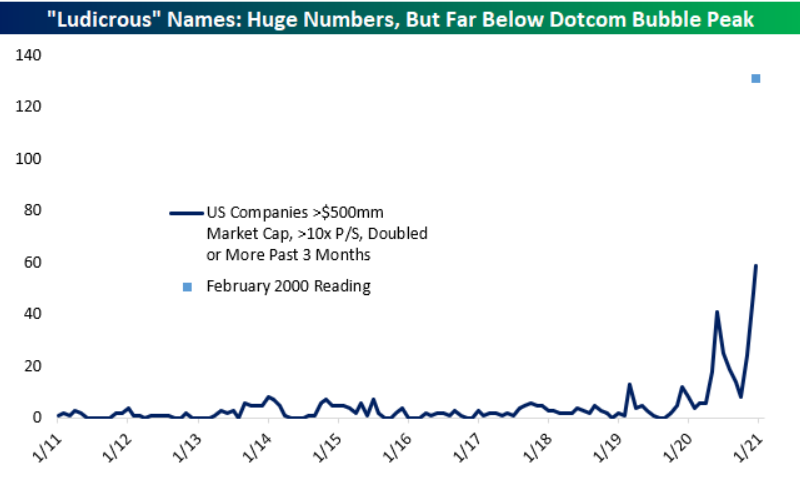Crumbs
- Luke Gromen thinks that the Fed will have to choose between saving the dollar or the economy and, as is right, it will save the economy,
- Fifty three thousand estate agents work in the UK. One in six hundred employees are estate agents. Probably, the
- Everything is OK, chaps. There is nothing to see in the tick up in bond yields. Ludicrous valuations are bit below where they were in the DotCom bust.
 .
.
Wrap
- Aluminium hits new lows (tracking energy),
- Rhodium hit new high, up 25% this month. Is Rh the new Pd?
- Janet Yellen, new Treasury Sec., announces stimulus of $1.9e12, and yet yields fall. All the normal functioning of markets has stopped,
- stocks higher (as always), with stimulus used as the explanation today,
- GBP higher: fatigue rally?
- VIX crushed: stimulus,
- all non-bond-like sectors up (i.e. utilities, consumer staples & real estate down),
- US Treasury yields up, German Treasury yields down: as usual (but by a tiny bit in both cases),
- Crude up ~2% (Brent), gas down. Most commods up, except silver, gas and a few grains.
Thought
The fundamental theorem of macroeconomics is that total production must equal total consumption. Keynes said, correctly, that the sole purpose of economic activity was to consume. If we equate utility with consumption, then to maximize utility is to maximize consumption. From this we can conclude that productivity is everything, especially in the long run. Even if we think that the environment is very important, we should still be concerned about productivity, of the total factor sort, because we want to minimize our use of all the factors of production, such as land.
Productivity is difficult to measure, and so nobody seems entirely sure whether it’s going up or going down. Keeping it going up is a tough problem, because once we’ve fixed productivity in one sector, it’s importance in the economy goes right down. Agricultural labour is much, much more productive now than it was in 1700, but it now represents a vanishingly small part of the economy now, so that technology has to be applied in other areas to make an impact. The vast bulk of our consumption is of non-food items.
Some services seem insanely difficult to make more productive. Not just the task of playing a Mozart quartet, but the business of moving a vehicle around in a big city. The average speed of a vehicle in recent years in central London is slower than it was a hundred years ago. Travel by commercial jet is now slower than it was fifty years ago. (The aeroplanes are not materially slower, but the time it takes to get through the airport is hugely longer.)
Elon Musk has promised to “solve traffic” by digging tunnels under big cities. In fact, even if he perfected the technology, he cannot do this, because this is under the control of local government, and they won’t let him. As private-sector, free market services become more efficient, they themselves wither as a component of our consumption, leaving the sluggish government sector looming ever larger. In the UK in 2020, it’s likely that the public sector bought over 60% of all goods and services. Clearly, this is largely a result of a sharp contraction in the private sector, but even a recovery will not halt the inexorable rise of the public sector. I am not making the argument that this is a malign political conspiracy: it’s just a reflection that all the easy tasks have been finished, leaving the only stuff left to do as difficult and doable, in practice, by the government.
Comments !